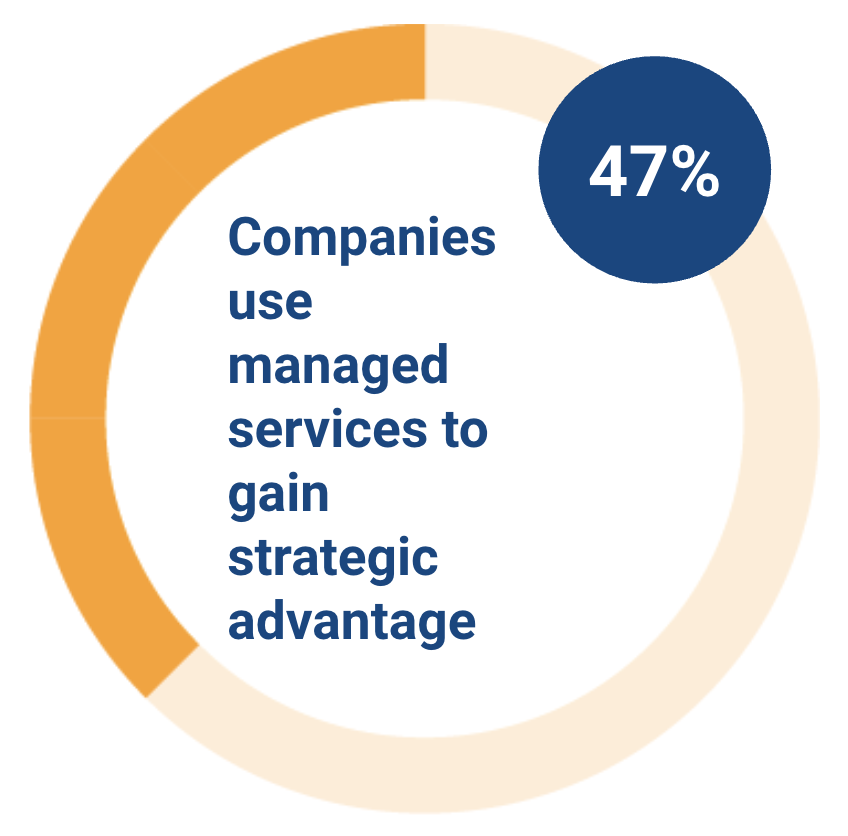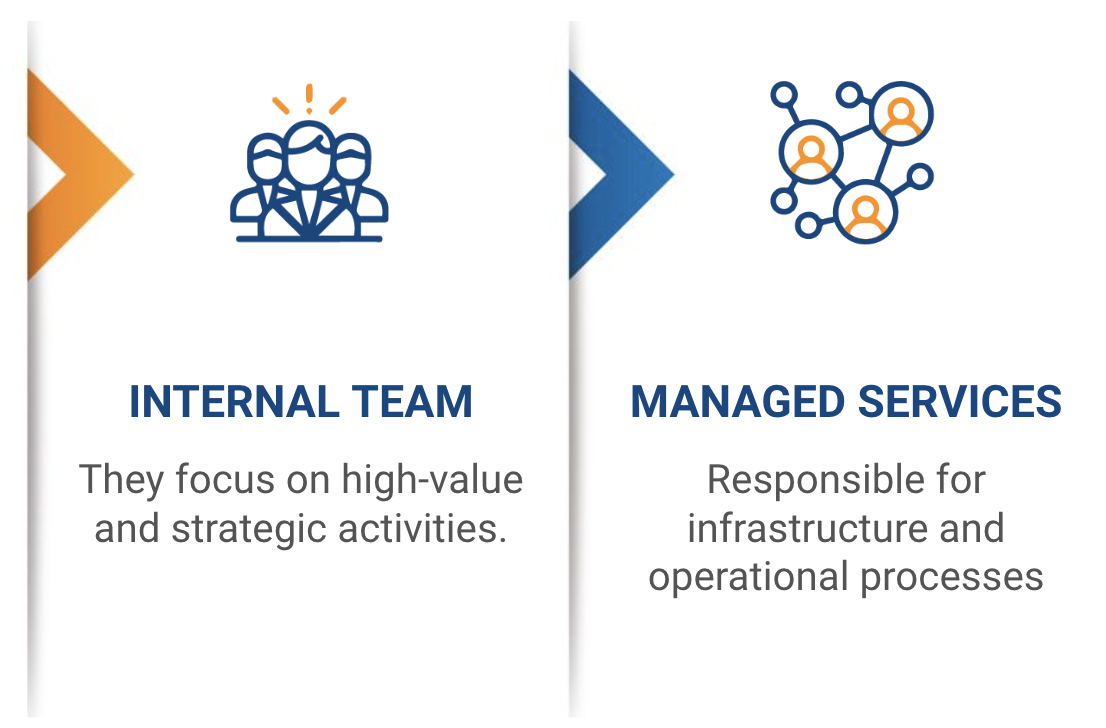
More and more global companies are adopting managed services to meet strategic needs that go far beyond simple cost efficiency. According to a PwC report, “High-performing organizations are turning to a more strategic set of managed services to access talent and technology, and go beyond labor and cost efficiency to achieve greater innovation and higher performance”.
This trend responds to several key factors, such as the need for specialized skills, the ability to innovate more quickly, and the pressure to stay competitive in an increasingly technological and globalized market.
We are very interested in the subject and that is why we created this blog, to evaluate how large companies are interested in managed services, how they are using them to achieve strategic advantages, and what specific benefits they are obtaining in their operations and growth.

Managed Services provider as a strategy to close skills gaps
One of the main reasons why companies opt for managed services is to close skills gaps. In an environment where technology advances at a rapid pace, many organizations face difficulties in finding and retaining talent with the necessary skills to handle advanced technologies and respond to changing market demands.
The PwC report highlights that 19% of companies use managed services specifically to cover these skills gaps. This strategy allows organizations to have immediate access to trained professionals without the need for lengthy and costly recruitment processes. In this way, they can focus on key areas of the business, such as product development and operations optimization, without sacrificing quality or technological capacity.
In addition, managed services providers are usually up to date with best practices and new technologies, allowing them to offer companies direct access to specialized knowledge. This advantage translates into greater agility, as organizations can respond more quickly to market demands and stay competitive in a rapidly changing environment.
Strategic advantages: Beyond cost reduction
While cost savings are one of the inherent benefits of managed services, today's leading companies are looking for something more. PwC's report notes that 47% of companies use these services for strategic advantages, such as improving their customer experience and staying technologically up-to-date. Rather than seeing these services as a simple tool to reduce costs, organizations are using them to create a competitive advantage in critical areas.

This strategy allows companies to access capabilities they do not have internally, such as advanced data analysis tools or emerging technologies. For example, with the support of managed services, companies can access external data to better understand consumer trends and develop products that directly respond to their customers’ needs. This approach is key for companies seeking to differentiate themselves through innovation and personalization of their offerings.
Increased speed of innovation and time to market with Managed Services
In addition to closing skills gaps and achieving strategic advantage, the use of managed services has been shown to accelerate innovation. PwC indicates that companies that adopt managed services to gain a strategic advantage are 1.6 to 2.4 times more likely to be faster to market and more innovative, respectively, than those that focus solely on cost savings.
This outcome is crucial in industries where speed of product launch and the ability to quickly adapt to market changes are key drivers of success.
For example, a technology company that uses managed services for the development and maintenance of its infrastructure can allocate more resources to the research and development of new products. This collaboration allows internal teams to focus on high-value activities, while the managed services provider takes care of the infrastructure and operational processes. This allows companies to experiment with new business models, test new technologies, and improve operational efficiency.

Managed Services as compliance support and employee training
Collaborating with managed service providers also offers advantages in terms of compliance and training. Global companies must comply with a complex framework of international regulations and standards, which vary by market and region. By partnering with specialized providers, companies can delegate compliance management to experts, thereby reducing the risk of errors and penalties.
On the other hand, many companies are also using these services to improve the training of their employees. Through managed services, they can offer ongoing training programs in specialized areas and emerging technologies. This not only helps improve team performance, but also increases staff satisfaction and retention, as employees have opportunities for professional development.
Cost reduction: A goal that remains the same over time
While leading companies are expanding their use of managed services for more strategic purposes, cost savings remain an important consideration. According to PwC, 4% of companies surveyed use managed services solely for the purpose of reducing operational costs, with no other motivation.
Cost savings are primarily achieved through the reduction of expenses associated with IT infrastructure, such as server and equipment maintenance, and labor costs related to internal staff. In addition, by contracting managed services, companies can optimize their resources by avoiding investment in technology that could become obsolete. Managed service providers assume these costs, and organizations can pay only for the services and capabilities they really need.
For those organizations that do not require a strategic advantage or closing skills gaps, managed services provider remain an effective solution to maximize operational efficiency and reduce overhead.

The Evolution of Managed Services in the Global Business Environment
Managed services have evolved from a cost-cutting tool to a key strategy for achieving high-level business objectives. Today, global enterprises are leveraging these services to access specialized skills, enhance innovation, accelerate product launch time, and strengthen regulatory compliance.
More than two-thirds of leading companies are already using managed services to gain strategic advantage or close skills gaps with their competition, and the results are evident.
By taking a comprehensive, collaborative approach with their managed services providers, organizations can create a competitive advantage that goes beyond operational efficiency. In an increasingly competitive market, managed services represent an invaluable opportunity to stay ahead and respond with agility to market demands and customer expectations.

